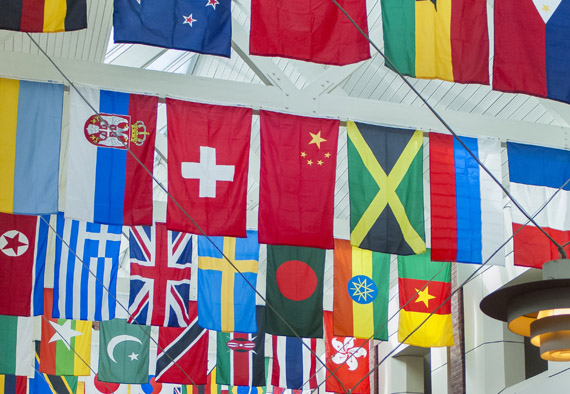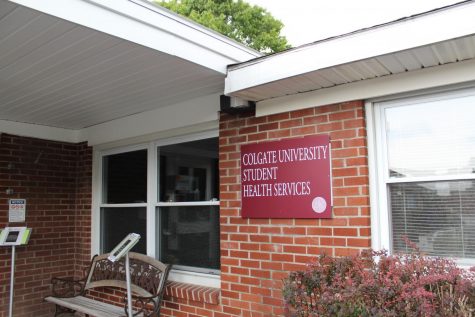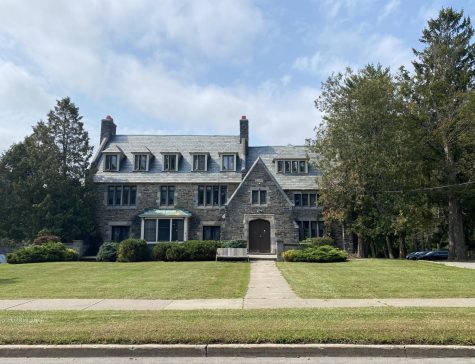Changing ICE Policies Amid Pandemic Cause Uncertainty for International Students

Colgate University (Gabriela Bezerra)
Flags in Frank Dining Hall represent the home countries of international and dual-citizen students at Colgate. According to University data, international students make up 11 percent of the incoming class of 2024.
The U.S. Department of Homeland Security has rescinded its plan requiring international students to leave the United States if the universities they attend plan to operate completely online for the Fall 2020 semester, as was announced by President Brian Casey in a campus-wide email. Colgate’s Offices of International Student Services (OISS) and Off Campus Study have worked swiftly to add approved programming to alleviate risk caused by these restrictions and pandemic travel restrictions. As returning international students now face uncertainty about housing on campus and studying outside the U.S., incoming international students still face policy that may prevent them from studying at Colgate.
According to the email sent Tuesday, July 14, news broke during a federal district court hearing in Boston for a lawsuit filed by Harvard University and Massachusetts Institute of Technology (MIT) opposing federal restrictions placed on international students by the U.S. Immigration and Customs Enforcement (ICE). As of now, international students with active SEVIS records can maintain their active SEVIS status and remain in the U.S. whether they choose to engage in remote or in-person learning.
“I welcome and applaud this shift away from a measure that was heartless and ill-conceived. The move comes amidst a massive wave of public concern and outrage that followed the original announcement,” Casey said. “This is early news, and we expect to hear more details shortly.”
As per guidance released on Monday, July 6 by ICE, international students would not have been permitted to remain in the United States while taking an entirely online course load for the Fall 2020 semester, lest they lose their U.S. visa status and face deportation. For schools such as Colgate offering hybridized forms of instruction, students with F-1 and M-1 visa status would not have been able to enroll in remote learning and would instead have opted for in-person instruction during the Fall 2020 semester if they wished to remain in the U.S. According to Colgate’s website, international students constitute 9.1 percent of Colgate’s current student body.
Casey announced in an email sent out Wednesday, July 9, Colgate would join an amicus brief — legal documents filed by non-litigants with a strong interest in the subject matter that advise the court of relevant, additional information — in support of Harvard and MIT’s lawsuit against the Trump administration. According to an article published by The Harvard Crimson, the lawsuit, filed with the district court in Boston on Wednesday, July 8, seeks to instate “a temporary restraining order and preliminary and permanent injunctive relief to bar DHS and ICE from enforcing federal guidelines.”
For all international students, the March 9 decision released by the Student and Exchange Visitor Program (SEVP) remains in place, allowing students with active SEVIS records to “engage in distance-learning, either from within the U.S. or outside the country, in light of COVID-19.” Students will be required to take and complete a full course load which is no less than three classes for the semester in order to have SEVIS records remain active and remain in status, according to the email.
Meanwhile, the Offices of International Student Services (OISS) and Off-Campus Study at Colgate developed approved programs in certain countries to alleviate stress regarding travel restrictions, risks associated with the pandemic and ICE guidelines. Now, students unwilling or unable to return to campus can enroll in approved programs and receive transfer credit for the purpose of continuing face-to-face learning if they so choose, rather than for SEVP immigration purposes.
Enrollment in these approved programs, according to the email sent out by OISS on Friday, July 10, will operate as per Colgate’s policy regarding approved programs, in that grades will be listed on student transcripts, but will not be computed in the Colgate GPA. Approved programs include CET Shanghai, CIEE South Korea, CET Vietnam and IAU Aix-en-Provence. As of Wednesday, July 15, 10-15 international students inquired or submitted an application to these approved programs, according to Associate Director of Off-Campus Study Casimer Sowa.
Students enrolled in approved programs will remain enrolled at Colgate and “will also pay regular Colgate tuition for the Fall 2020 semester,” according to OISS’s email. In cases where the student cannot commute and must reside in campus housing, Colgate will invoice students the program’s housing fee on the fall semester term bill. For students who receive financial aid through Colgate, their aid will remain in place and apply towards the overall costs of the semester fees for an approved program.
Some Chinese students are petitioning for Colgate to expand the range of approved programs in China. In the petition letter sent to administration, sophomores Yuexi Zhang, Sihan Wu and junior Qian Qin requested that Colgate approve of programs in Xiamen University, a more renowned Chinese institution Colgate has previously partnered with for study abroad programs. The organizing students say they have yet to receive a response from the University.
“The program (CET Shanghai) confines our course selection to only four disciplines, not to mention the narrow range of course offerings with only 29 courses altogether,” Zhang said. “In the meantime, we have to be overloaded for a satisfactory amount of credits: we have to take five courses in order to get four credits, while four courses for three credits.”
Students who elect to participate in remote learning through Colgate will be charged for tuition and fees, but not for housing or meals, Senior Associate Dean and Director of Financial Aid Gina Soliz said.
“As a result, the Colgate [financial] aid award might be slightly lower due to the cost of attendance being lower. In most cases, this will result in a decrease in the amount owed to the University, even if the aid amount is less than in previous years,” Soliz said.
In a Tuesday, July 21 email to international students, OISS specified that students opting for remote learning will remain enrolled in the Colgate health insurance plan, but will be provided the option to waive this coverage. International students opting for in-person or hybrid learning will need to enroll in the Colgate health insurance plan or provide proof of equivalent coverage plans.
As per OISS’s email, it remains unclear what implications remain for incoming members of the Class of 2024 applying for visas for the first time. However, clarifying guidance put out by ICE Friday, July 24 for the Fall 2020 semester based on March 9 Spring Guidance states that “new or initial nonimmigrant students who intend to pursue a full course of study that will be conducted completely online will likely not be able to obtain an F-1 or M-1 visa to study in the United States… [and] will not be able to enter the United States to enroll in a U.S. school as a nonimmigrant student for the fall term to pursue a full course of study that is 100 percent online.”
“OISS is still awaiting further guidance from ICE and will update you when we have more information,” the Office said. “We are aware that the semester and deadlines are fast approaching but we do not have all the answers or all the guidance needed from the Department of Homeland Security to provide answers to all your questions.”
For students who take a personal leave of absence for the fall semester or the entire academic year, the student’s SEVIS record will be terminated to reflect the change. OISS will need to establish new SEVIS records for students planning to return to campus for the Spring 2021 semester after a leave of absence. The student will also have to reapply for a new visa, which may impact the ability to apply for work and internship authorization, including Curricular Practical Training (CPT) and Optional Practical Training (OPT). Students under leaves of absences will not be permitted to remain in the U.S.
As detailed in the Task Force’s plan to reopen, first-year students are scheduled to move in on Sunday, Aug. 23, and upperclassmen on Monday, Aug. 24 and Tuesday, Aug. 25, with classes beginning Thursday, Aug. 27. Student move-in will include COVID-19 testing prior to arrival and quarantine procedures that have yet to be announced, according to an email sent out Tuesday, July 21 by Associate Vice President for Campus Safety, Emergency Management and Environmental Health and Safety Dan Gough.
Early arrivals will not be permitted before Monday, Aug. 10 and “will only be approved for extenuating and complicated circumstances due to travel bans and other international restrictions,” according to OISS’s email.
According to guidelines developed by the Colgate Task Force on the reopening of the Colgate campus, “the University must establish a protocol for re-closing should the need arise,” per New York state guidelines. Currently in Singapore, sophomore Nandini Krishna said she and her family are concerned about possible outbreaks of COVID-19 on campus that could cause an abrupt mid-semester closure.
“My family’s biggest concern in me going back to campus is the isolation, because while this does tend to work in the school’s favor, it also means that in the case of emergency evacuation it’s very tough for me to get home,” Krishna said.
Housing options for international students and others who need to remain on campus when Colgate classes move online following Thanksgiving recess remain unclear. The Office of Residential life did not respond to requests for comment.
As the incoming president of the New York Six Liberal Arts Consortium (NY6), Casey released the NY6 Presidents Object to Federal Actions statement Wednesday, July 8, expressing a “collective objection to these restrictions,” including the ICE guidelines released on July 6 and the suspension on H-1B visa program, which remains in place.
New York Six presidents also objected to President Trump’s Executive Order to suspend the H-1B visa program, “which is critically important to our ability to hire faculty and postdoctoral scholars with unique skill sets that ensure we are preparing the next generation of American workers with the highest quality education possible.”
Bradford Wiley Chair in International Economics and Professor of Economics Chad Sparber co-authored two policy briefs outlining how Trump Administration policies limiting skilled migration, including the suspension of H-1B visas, and ICE guidelines would be economically disastrous. His research was used as evidence in the lawsuit filed by Harvard and MIT. Though ICE guidelines have been reversed, H-1B visa processing has remained frozen.
“If prospective students seek a U.S. education partly in hopes of securing U.S. employment after graduation, and the US makes it harder to work here, then the value of a U.S. education drops,” Sparber said. “We know that when the H-1B program was severely curtailed back in 2004, it reduced foreign enrollment by 10 [percent]. It also resulted in a 1.5 [percent] decline in overall SAT scores and a 2.8 [percent] decline in the grade point averages of prospective students. We also know that there are large spillover effects to university activity. For example, a 1 [dollar] increase in university spending causes an 0.89 [dollar] increase in local non-education labor income. But what we don’t yet know is how many people will be deterred.”
Concerned about the future of ICE changes and American immigration system, international student and junior Aaron Miller said the changing situation has caused him to reconsider his future plans.
“When I first started [at] Colgate, I loved the idea of staying in the U.S. and working once I graduate. However, there seems to be a great deal of hostility towards immigration in the U.S. Getting a visa should be the hard part, but in America it seems even once you have a visa it can still be worthless as there are so many restrictions placed on you,” Miller said.
Addressing whether anti-immigration policies may impact the future of admissions or the proportion of the international student body, Associate Dean of Admission and International Coordinator Corianne Deatly said there are no plans to change admissions practices for international students next year.
“Colgate is committed to building a diverse campus, and our international students continue to be an integral part of our community,” Deatly said.
In response to questions about potential actions U.S. higher education institutions could take to offset hostile environments created by anti-immigrant policies, Sparber recommends first steps to involve counseling services to international students and workers.
“If you want an economics answer, then I would start by noting that university education is an export industry. The Institute of International Education (IIE, 2019) records that over 430,000 foreign undergraduate students studied in the US in 2018/19, 83.5 [percent] of whom listed ‘Personal and Family’ financial support as their primary funding source. NAFSA: Association of International Educators (2020) reports that foreign students contributed 41 Billion dollars to the US economy and supported over 450,000 jobs in 2018/19,” Sparber said. “Full-pay foreign students help universities subsidize the cost of education for lower income Americans. That kind of economic power carries weight. Universities can lobby or sue the government, which could cause the policies to be overturned — much as what happened with the ICE guidelines.”
For Krishna, the dynamic nature of the situation has led to much uncertainty in whether or not she will return to campus in the fall.
“It was a particularly traumatic and anxiety-inducing time — there were new laws and documents and interpretations being released everyday,” Krishna said. “As an international student who has taken the big decision to study so far away from home, it was discouraging to be treated essentially as a pawn in the government’s move to force universities to stay open. It’s hard to trust the immigration policies as they stand now because it feels as though ICE can change these policies again, just as quickly.”









